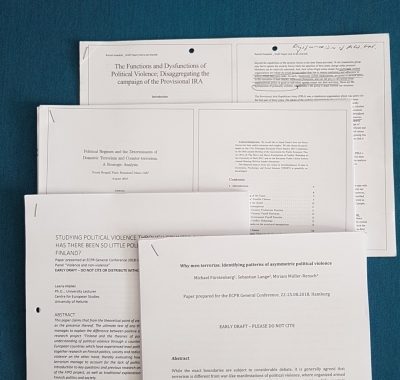
After a couple of months of preparation Michael, Sebastian and I were able to host a great panel at the ECPR in Hamburg under the umbreall of the Standing Group on Political Violence:
Rachel Kowalski: The Functions and Dysfunctions of Political Violence; Disaggregating the campaign of the Provisional IRA
Leena Malkki: Studying political violence through counter cases: Why has there been so little political violence in post-war Finland?”
Mario Gilli: Political Regimes and the Determinants of Domestic Terrorism and Counter-Terrorism. A Strategic Analysis
And our Paper framing the Panel: Michael Fürstenberg , Sebastian Lange, and Miriam Müller (-Rensch):
Why men terrorize. Identifying patterns of asymmetric political violence
And this is what our paper was about…
Why men terrorize. Identifying patterns of asymmetric political violence (Abstract)
While the exact boundaries are subject to considerable debate, it is generally agreed that terrorism is different from war-like manifestations of political violence, where organized armed groups engage in direct hostilities aiming at the outright destruction or attrition of the enemy’s capability to fight. While the logic of violence is relatively straightforward in these cases – defeat the opponent outright or persuade him that the degradation of his forces will eventually lead to his demise –, the logic of terrorism and political violence which cannot actually threaten the material capabilities of the state is less clear. A number of mechanisms aiming to catch how violence “works” have been proposed, but may be inconsistent or even contradictory; some even suggest that violence is not instrumentally rational after all, but rather a mere side effect of organizational or psychological dynamics. A number of recent empirical studies conclude that there is no demonstrable link between the violent means and the political success of terrorist groups.
In this paper, we firstly, review the state of the field concerned with theoretical approaches towards non-warring forms of political violence by non-state armed actors. Secondly, by systematizing the disparate variety of explanations and approaches, we aim to suggest a draft of a unifying conceptual framework to inspire future research on the topic.
In case you missed the panel on Functional Logics of Poolitical Violence and would like to learn more about our ongoing debates: Don’t hestitate to contact me and I’ll get you in touch with our presenters! (contact (a) daspoliticum.de)

Antworten